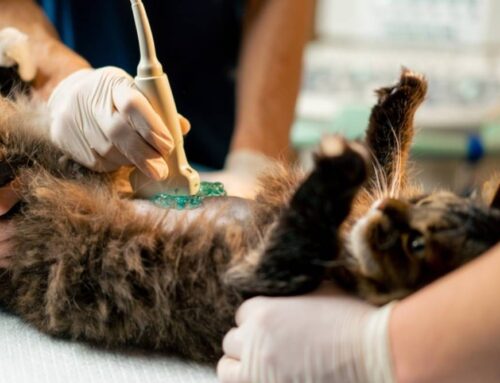Managing Chronic Disease in Older Dogs: A Pet Owner’s Guide
Senior dogs bring a special kind of joy; the calm companionship and quiet loyalty that only come with age. But as pets grow older, their bodies change in ways that require more attention and care. Chronic conditions like arthritis, diabetes, and kidney disease can appear gradually, often mistaken for normal aging. With proactive veterinary care and at-home support, many dogs continue to live active, comfortable lives well into their golden years.
At Village Animal Hospital in Wichita, KS, our AAHA-accredited team takes a Limitless Care approach to senior health. That means empowering you with knowledge, partnering with you through every stage, and ensuring your dog never walks this path alone.
When Slowing Down Signals More Than Age In Your Pet
It’s easy to chalk up slower walks, longer naps, or reluctance to climb stairs to “just getting old.” But these changes often indicate something deeper like pain, hormonal imbalance, or organ decline.
Metabolism slows as dogs age, but persistent lethargy, changes in appetite, or sudden disinterest in play should always prompt a veterinary exam. Some dogs also develop anxiety or restlessness as they age, showing distress through pacing or whining at night. These are also signs that shouldn’t be ignored.
Our team uses comprehensive diagnostic services, including bloodwork, urinalysis, and imaging, to uncover issues early and guide treatment. These tools help us monitor organ health, detect arthritis before it becomes debilitating, and track subtle changes in body condition.
We recommend wellness visits at least twice a year for senior dogs. These regular check-ins allow us to adjust medications, monitor chronic illnesses, and recommend pain management or lifestyle adjustments before small problems become emergencies.
Common Chronic Conditions in Senior Dogs
Aging pets often manage more than one health condition at once. Understanding the most common challenges helps you recognize symptoms early and respond appropriately.
Arthritis and Mobility Loss in Senior Pets
Arthritis in dogs is one of the most frequent age-related diseases. Cartilage in the joints wears away, causing inflammation, stiffness, and pain. Signs include difficulty rising, hesitating to jump, or moving more slowly on walks.
Our pain management services include anti-inflammatory medications, laser therapy, and lifestyle changes to ease discomfort. Maintaining a healthy weight reduces joint strain, while gentle exercises and warm, supportive bedding improve mobility. Using ramps, non-slip rugs, and assistive devices makes daily life easier and safer. For advanced arthritis, physical therapy and alternative treatments like acupuncture may provide additional relief and help preserve strength.
Heart Disease in Senior Dogs
Heart conditions such as valve disease and cardiomyopathy are common in aging dogs. Signs include coughing (especially at night), reduced stamina, or rapid breathing at rest. Some dogs may faint after excitement or exertion.
Heart disease diagnosis relies on chest X-rays, echocardiograms, and bloodwork to evaluate heart function. Treatment typically involves medications that reduce fluid buildup, strengthen heart contractions, and control blood pressure. A low-sodium diet and weight control help lessen strain on the heart. With early detection, many dogs live comfortably for years after diagnosis.
Kidney and Liver Disease in Senior Dogs
When the kidneys or liver lose efficiency, waste products build up in the body. Dogs may drink excessively, urinate more often, lose weight, or experience nausea. Vomiting or bad breath can also appear as toxins accumulate.
Chronic kidney disease is managed with dietary adjustments, fluid therapy, and regular monitoring. For liver conditions, supportive care focuses on medications and supplements that help organ regeneration and reduce inflammation. Routine bloodwork and urinalysis track organ function and guide care, allowing us to adapt treatment as your dog’s needs evolve.
Hormonal Disorders in Senior Dogs
Two endocrine disorders frequently appear in senior dogs: diabetes and hypothyroidism.
Diabetes in pets causes excessive thirst, frequent urination, weight loss, and fatigue. Consistent insulin therapy and diet regulation help most diabetic dogs lead full, stable lives. Owners play a critical role by maintaining feeding schedules and monitoring glucose levels at home.
Hypothyroidism results from low thyroid hormone production, causing sluggishness, weight gain, and thinning fur. Daily oral medication restores energy and coat quality within weeks and is typically lifelong but very manageable.
Cognitive Decline in Senior Dogs
Like people, dogs can experience age-related memory and behavior changes. Cognitive dysfunction syndrome causes disorientation, house-training accidents, and altered sleep patterns. Dogs may seem confused, stare at walls, or withdraw from family activities.
Structured routines, gentle exercise, and puzzle toys help stimulate the brain. Diets rich in antioxidants and omega-3 fatty acids can slow progression. Medications are available to improve alertness and reduce anxiety. Keeping lights on at night or using calming pheromones can also help dogs who become restless after dark.
Cancer in Senior Dogs
Common cancers in pets include lymphoma, skin tumors, and bone cancers. Early detection is key. Any new lump or unexplained weight loss warrants prompt evaluation. Diagnostic imaging and lab testing determine cancer type and guide treatment, which may involve surgery, chemotherapy, or palliative care focused on comfort.
Pain management plays a vital role in cancer treatment. At Village Animal Hospital, we work closely with owners to balance medical therapy and emotional support, ensuring every patient maintains comfort and dignity.
Dental Disease in Senior Dogs
Dental care matters more than many realize. Gum infection allows bacteria to enter the bloodstream, damaging internal organs. Dogs with dental disease often eat less, drool excessively, or develop bad breath.
Professional dog dental cleanings under anesthesia remove plaque and tartar both above and below the gumline. Our team uses digital X-rays to assess tooth roots and bone health, ensuring no hidden pain remains untreated. Daily brushing, dental chews, and water additives can help preserve oral health between visits.
Comfort and Care at Home for Senior Dogs
Small adjustments can make a big difference for aging pets:
- Provide orthopedic bedding to cushion joints and improve sleep.
- Use non-slip rugs on hard floors to prevent falls.
- Raise food and water bowls for easier access.
- Offer short, gentle walks instead of long ones, and try swimming for low-impact exercise.
- Keep routines consistent to reduce confusion and anxiety.
- Use baby gates or ramps to make favorite areas accessible.
- Keep nails trimmed- overgrown nails can alter gait and worsen joint pain.
Environmental enrichment also supports mental and emotional health. Scent-based games, interactive toys, and calm companionship help keep senior dogs mentally sharp and emotionally content.

The Role of Preventive Care for Senior Dogs
The best way to manage chronic disease is to catch it early. Routine bloodwork, urinalysis, and imaging identify problems before symptoms become obvious. Regular exams allow your veterinarian to adjust medication, nutrition, and exercise plans as your pet’s needs change.
Preventive care also includes parasite prevention, which remains important for older pets whose immune systems are weaker. Heartworm, flea, and tick protection should never lapse, as infections can be more severe in senior dogs.
At Village Animal Hospital, our team ensures visits are low-stress for pets, while our AAHA accreditation guarantees we meet the highest standards of medicine and safety. For emergencies during business hours, our doctors provide immediate stabilization and support, with seamless referrals after hours when needed.
Helping Your Senior Dog Live Fully Through Every Stage
Chronic disease doesn’t mean the end of joy, it simply calls for more attentive care. With early detection, compassionate treatment, and teamwork between you and your veterinary team, senior dogs can enjoy comfortable, happy years.
If your dog has started slowing down or you’ve noticed changes in appetite, mobility, or behavior, schedule a senior wellness exam with Village Animal Hospital. Together, we’ll design a personalized care plan that supports your dog’s unique needs and keeps their tail wagging through every season of life. Contact us today to learn how our Limitless Care approach helps your pet and you navigate aging with confidence and compassion.








Leave A Comment